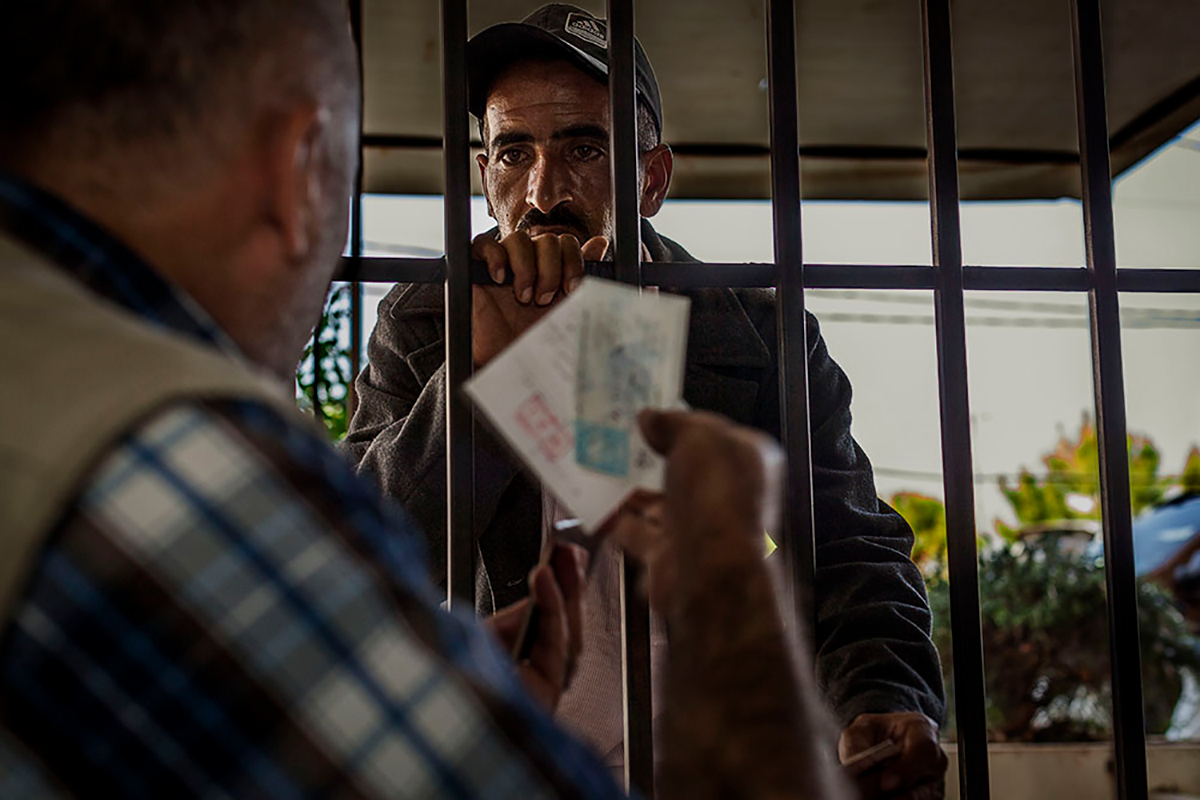
Syrian refugees blamed for Lebanon’s problems
Analys. As political tension along the sectarian divides between Shia-,and Sunni-muslims is on the rise in Lebanon, Syrian refugees are increasingly blamed for the country’s economic and structural problems. Today, around 1.5 million Syrians has taken refuge in Lebanon. The historical wounds of the Lebanese civil war and the dominating position of the shiite Hezbollah has given way for a climate ripe of unease and contempt for Syrian refugees, writes Simon Fiedler, intern for the MENA program at the UI. At the same time the international community has despite their efforts, failed to prevent an increase in the number of Syrian refugees that lack residency permits.
Publicerad: 2017-10-09
Historical Background
In a country that still ail from the memories of the fifteen year-long civil war between 1975-1990, similarities are drawn between the Palestinian refugees that mostly arrived after 1948 and the Syrian refugees that have arrived since 2011. Then, the large influx of mostly Sunni-Muslim Palestinians upset the sectarian balance that the country’s political system is still predicated upon. Palestinians settled in refugee camps that solidified sectarian divides and became a breeding ground for communitarian strife in the 1970s.
As the PLO strengthened their power in Palestinian neighborhoods during the early 1970s, tensions arose with the political establishment resulting in the civil war between different Muslim and Christian factions. Since the Iranian revolution in 1979 and the founding of Hezbollah the following year, the Shiite population, likely Lebanon’s largest ethno-religious group has become an increasingly important political power in the country.
No refugee camps has been set-up
Contrary to other countries in the region that has accepted Syrian refugees, such as Jordan and Turkey, the government in Beirut decided to not establish official refugee camps. An important factor in the decision is the aversion and fear of refugee camps becoming permanent settlements where militant groups could emerge. Since 2015 the government of Lebanon has instituted harsh restrictions on residency permits for Syrian refugees. In May of that year the UNHCR, following Lebanese directives, ceased registering Syrian refugees. According to Human Rights Watch these restrictions have resulted in that nearly 70 per cent of the Syrian refugees in Lebanon lack legal residency permits.
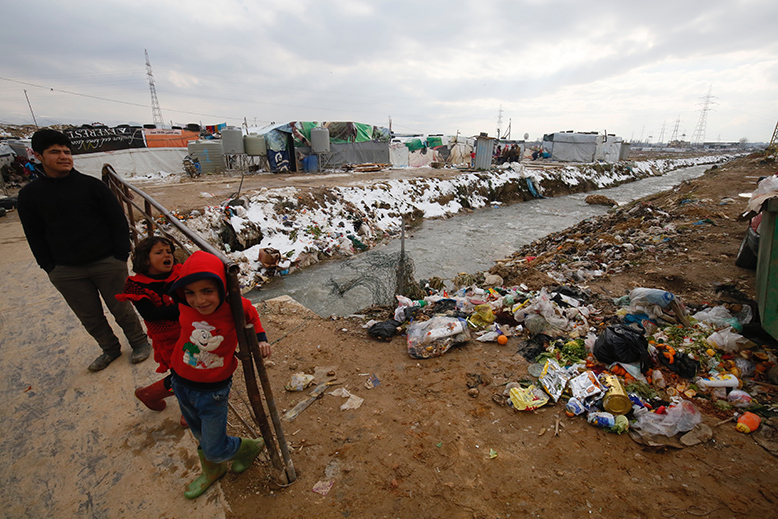 Syrian refugee children stand amongst snow, mud and rubbish, in an informal tented settlement in Lebanon's Bekaa valley. Photo: Russel Watkins/DFID
Syrian refugee children stand amongst snow, mud and rubbish, in an informal tented settlement in Lebanon's Bekaa valley. Photo: Russel Watkins/DFID
The so-called no-camp policy has dire consequences for the distribution of humanitarian aid and the living conditions of Syrian refugees. The fear of arrest and economic constraints has meant that a significant number of refugees have settled in informal refugee camps in the rural regions of Balbeek-Hermel, Akkar, and the Bekaa-valley. These regions were already before the conflict plagued by poverty and high levels of unemployment. The small and dispersed refugee settlements complicates the delivery of international aid while the capacities of health care facilities, schools, and infrastructure are strained.
The fear of arrest from lacking legal residency has exacerbated the already serious inadequacies in alleviating the conditions of Syrian refugees. Institutional and de facto restrictions on freedom of movement as well as a lack of confidence in Lebanese authorities has led to serious concerns of economic exploitation. As parents are unable to work child labor, child marriage and prostitution has spread.
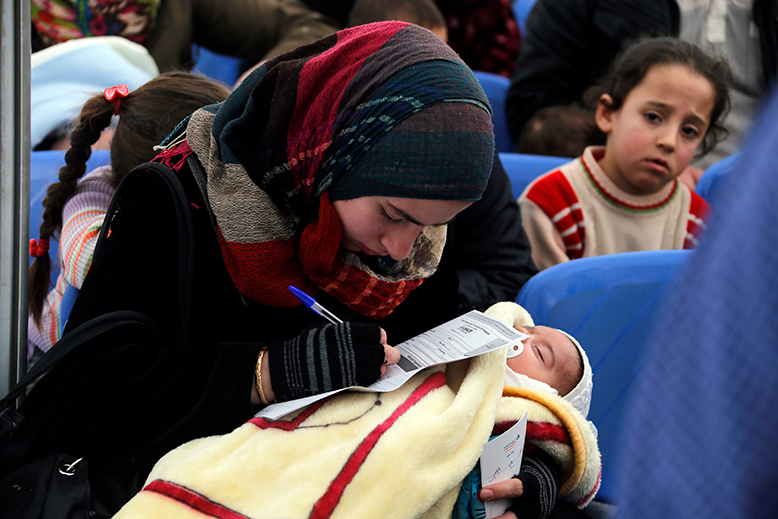 A refugee filling an application at the UNHCR registration center in Tripoli, Lebanon. Photo: Mohamed Azakir/World Bank
A refugee filling an application at the UNHCR registration center in Tripoli, Lebanon. Photo: Mohamed Azakir/World Bank
The UN and international aid
Support from the international community has since the start of the conflict been inadequate for the UN to fulfill its services. UN humanitarian aid is primarily directed to the most vulnerable populations. However in identifying the most vulnerable, the UN relies on assessments that includes information from the UNHCR. Thus the approximately 500,000 Syrian refugees not registered with the UNHCR are at further risk of not receiving basic assistance as their needs are not properly assessed. Moreover reports on the living conditions of the overall Syrian refugee population can be misleading as a large part are excluded from the UN report.
The international aid to Lebanon and the refugee crisis has during recent years declined. Last year the UN and its partners reported a deficit of more than half of the sum it appealed for, while only 19 per cent of the annual appeal had been financed as of July this year. This has inadvertently led to decreasing amounts of aid that is distributed through, for example the World Food Program whose resources are slated to decrease over the next three years. The decline is concerning as 93 per cent of the Syrian refugee population cannot fulfill their basic nutritional needs.
Lebanese refugee policy
Lebanon’s history can in-part explain the policies that the Lebanese government has instituted toward Syrians. The majority of refugees want to return to Syria, but this is dependent on a cessation of hostilities and the political development in the aftermath of the conflict. As the long-awaited Lebanese parliamentary elections are to be held this spring, the refugee crisis has become a key issue.
Since 2007 the political field in Lebanon has been marred by the split along sectarian divides between the pro-Syrian 8-March movement, which includes Hezbollah contra the current prime minister and Sunni-muslim Saad Hariri’s, now fragmented 14-March movement. From 2014 to 2016 the country lacked a president until Michel Aoun was elected in October of last year. Aoun is a Maronite Christian in accordance with the constitution and hail from the 8-March movement. Since then, the political stalemate has been further bridged by the passing of a new electoral law in July of this year, paving way for the upcoming elections.
The Lebanese economy and institutions suffered from structural problems even before the Syrian refugee crisis. But despite the political gridlock, Mohammad Abdallah, director of the Syrian Justice and Accountability Office in Washington, claimed in an interview with Utrikesmagasinet that Lebanese politicians has renounced their responsibilities and rather turn to blame Syrian refugees for the country’s problems.
Several violent attacks have struck the country in recent years and as such the public opinion increasingly support harsher policies. Hezbollah has attempted to capitalize on the tense security climate. Clashes in border regions around the town of Arsal has led to Hezbollah-coordinated repatriations of Syrian refugees and fighters. Hezbollah see it as an opportunity to regain public support which it has in-part lost due to internal debate over the group’s costly entanglement in the Syrian civil war. At the same time Hezbollah has depicted the mostly Sunni Muslim Syrians as a threat to Shiites, their Lebanese Christian allies, and to the sectarian distribution of political power.
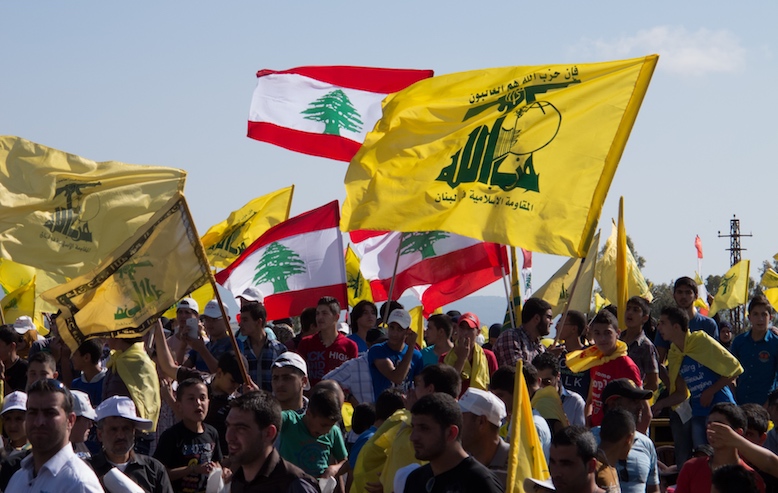 Hezbollah's supporters at Liberation Day in Bint Jbeil. Photo: Shutterstock
Hezbollah's supporters at Liberation Day in Bint Jbeil. Photo: Shutterstock
The repatriation of Syrians from Arsal on August 2nd, have been followed by a number of smaller initiatives coordinated by Hezbollah. The Lebanese coalition-government agree on the eventual return of Syrians but it disagrees over the terms of such. Prime Minister Hariri is critical to forced returns and he is adamant that repatriations must follow international law; being voluntary, and under UN oversight. His statement can be seen as a political balancing act ahead of next year’s elections between growing antagonism to refugees while adhering to international law.
During an interview with Utrikesmagasinet, Sigrid Kaag, the UN Coordinator for Lebanon, commented on the repatriation, saying: ”We try to be present and we interview people when we are there… if it’s not through the UNHCR then it will be with NGOs to make sure, to the maximum extent possible that all those who return do so voluntarily and in safety and dignity.”
However, the UN could not be present due to safety concerns. Although the Lebanese Red Cross partook in the operation through ”logistical support”, they have not confirmed whether the returns were voluntary or not.
It is generally known that opposition fighters live among Syrian refugees and Lebanese security forces have in-turn raided informal refugee camps, citing security concerns. This is founded on the complicated relationship between Hezbollah, which is the country’s most powerful force and a government partner, and the Lebanese security forces. Hezbollah’s military wing has been labeled by the EU as a terror-organization, while the US regards Hezbollah in its entirety as a terrorist organization. Hezbollah, as a crucial military supporter to the Assad regime has led several offensives against Sunni opposition and extremist fighters in the Qalamoun-region, bordering Lebanon. As fighting has spilled-over to Lebanon, the Lebanese Armed Forces have become increasingly drawn into the conflict. The Lebanese Armed Forces are intent on maintaining its legitimacy in defending the country’s territorial integrity and its involvement is seen as a counter-balance to Hezbollah’s activities.
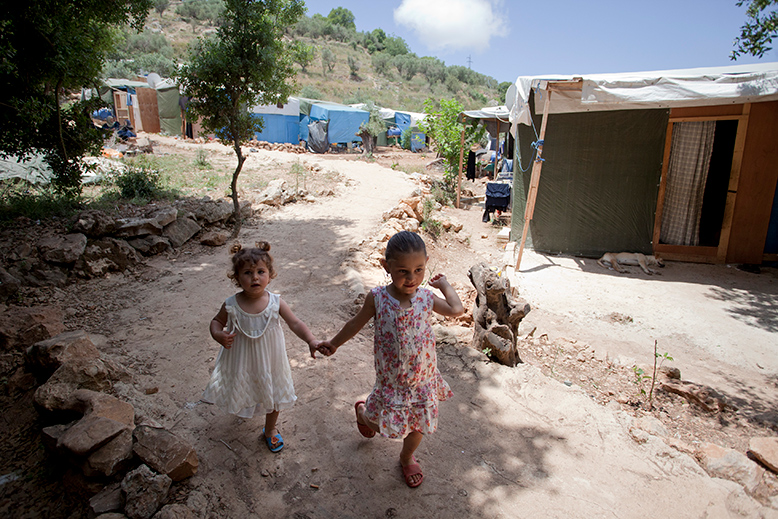 Syrian refugee children in the Ketermaya refugee camp, outside Beirut. Photo: Dominic Chavez/World Bank
Syrian refugee children in the Ketermaya refugee camp, outside Beirut. Photo: Dominic Chavez/World Bank
Conclusion
The situation in Lebanon for Syrian refugees, particularly for those who do not have residency permits, is becoming increasingly precarious. The lack of legal protection under the UN refugee convention and the refugees that lack residency permits are at risk of detention. The restrictions on their freedom of movement has severe consequences on their living conditions such as facing difficulties in seeking medical attention, and getting an education where many children instead are forced into labor and marriage. These issues are exacerbated by inadequate international aid that cannot meet basic needs, while to a large extent excluding non-registered Syrian refugees.
At the same time fear among Syrian refugees has reportedly increased as a result of a political climate permeated by anti-refugee sentiment. The raid in Arsal by Lebanese security threatens the two year-long legal status quo that non-registered refugees has lived under. It is still unclear to what extent state actors have partook in the Hezbollah-coordinated repatriations in recent months. Likewise the question of the legality of these repatriations remain, particularly whether non-combatant Syrians have returned involuntarily. However seen from the precarious living situation of non-registered refugees a repatriation can be seen by many as the least bad decision.